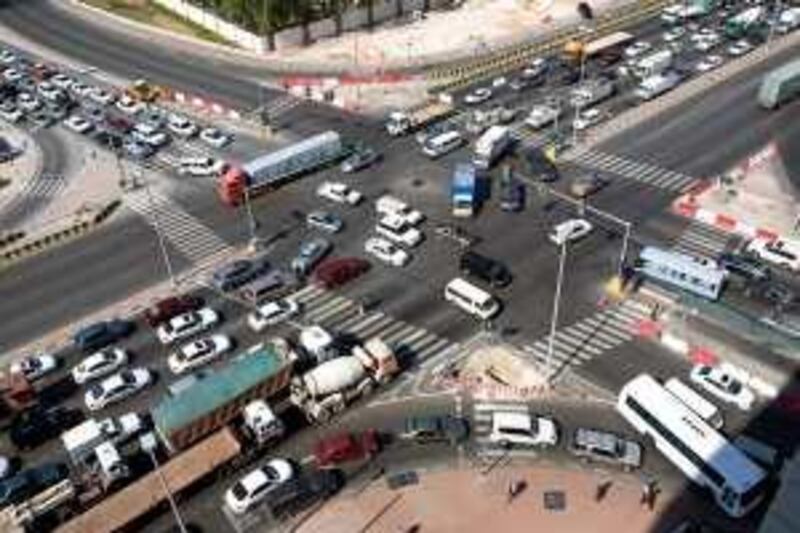ABU DHABI // Motorists face paying a congestion charge for driving into the centre of the capital - but not before the city has adequate alternatives to using the car, transport officials said yesterday. Khalid Hashim, executive director of land transport for the Department of Transport, did not specify what the charge would be but added: "You cannot introduce cordon pricing or congestion charging when you do not even have your bus network ready."
Trams and light rail will start operating on a 350km-long network in 2014 with a 131km metro system running two years later, the department's chairman, Abdulla al Otaiba, said on Sunday. There will be 1,360 buses operating around the emirate by the end of next year. The policy of discouraging car use in congested areas of Abu Dhabi forms part of the department's Surface Transport Master Plan. Full details of the plan to overhaul transport in the capital over the next 20 years are expected to be released early next month.
In a working paper published last year on the department's website, one of the scenarios under consideration included emirate-wide congestion charging and cordon pricing for entering the Abu Dhabi metropolitan area. In London, a congestion charge of £8 (Dh40) a day applies to drivers of vehicles entering central districts between 7am and 6pm on weekdays. Residents who live in the zone receive a discount.
Mr Hashim revealed that in addition to congestion charges, the department aims to encourage car pooling and create dedicated bus lanes and a network of cycle paths. "It's not always the stick," he said on the sidelines of a conference on sustainable development at the Shangri-La Hotel. "Some carrots will be there also. The policies will be there. "We will make sure not to introduce such policies until we have sufficient infrastructure."
A parking management programme would introduce paid meters to some of the city's most congested roads. Saeed al Hameli, general manager of the department's buses, said incentives to use public transport were needed. "What we talked about is to bring people into relying on transport, looking to the public transport in general as a preference," he said. "That is the major challenge." Motorists yesterday said they supported the move towards a congestion charge once alternative modes of transport became available.
"It is good, there is much traffic here," said Abdulrahman Karmastaji, 37, adding that it should not be too high a charge. Fadi Shanaah, a 34-year-old Jordanian, said he was at first opposed to the idea because he thought the charges would be introduced without improvements to transport. "This is not London," he said. However, once he was told that the Government planned the measure after alternative transport was available, he said he would rather use public transport than drive.
Meanwhile, a study for cycle paths and bus lanes was expected to be completed soon, Mr Hashim said, "We will have a study soon about bikeways. We can make a network," he said. "We have eight months of good weather. "We also have to encourage the employers to have facilities for their staff who are coming on bikeways to have a shower." As for the dedicated bus lanes, Mr Hashim said that depending on the study, they could also be for taxis and emergency vehicles, or be made high-occupancy vehicle lanes for use by carpoolers.
Earlier, Abdelgader Elshabani, senior transportation planning specialist, presented the masterplan process to the conference, which was hosted by the International Association of Public Transport and the department. Mr Elshabani said that 350km of tram and light rail lines would be built in phases by 2030. He hoped that consulting firms would be bidding for the right to conduct a study on implementing the lines.
The department was also preparing a request for proposals on a study into possible ferry services. The masterplan would propose initial routes, he said. "Looking to the future we want water transport connecting the capital's 200 islands," he said. Mr Elshabani also said the department had talked to officials in Dubai about building a railway between the two emirates. Also yesterday, Jameela al Shaiba Hameli, director of the customer service division of TransAD, the emirate's taxi regulator, said that all of the silver taxis would be converted to run on compressed natural gas by 2010. By that time, she expected 7,147 silver cabs to be operating in the emirate.
mchung@thenational.ae






